Kasich tries to praise Latinos - and ends up talking about tipping the hotel maid
By the numbers
Welcome to Trail Guide, your daily blog on the 2016 presidential campaign. The GOP candidates at last night's marathon debate covered a lot of ground. This is what we're watching:
- One way to know who won is to check the markets , says The Times' David Lauter.
- Carly Fiorina had the 'mic drop' moment she's been looking for.
- What else happened? The Times' Mark Z. Barabak has this roundup of the three-hour endurance test.
- What did it all mean? The Times' Cathleen Decker says we saw Donald Trump's weak spots .
- Trump's rivals stood up to him on immigration.
- Trump says CNN was fair to him - others should have gotten more time.
Kasich tries to praise Latinos -- and ends up talking about tipping the hotel maid
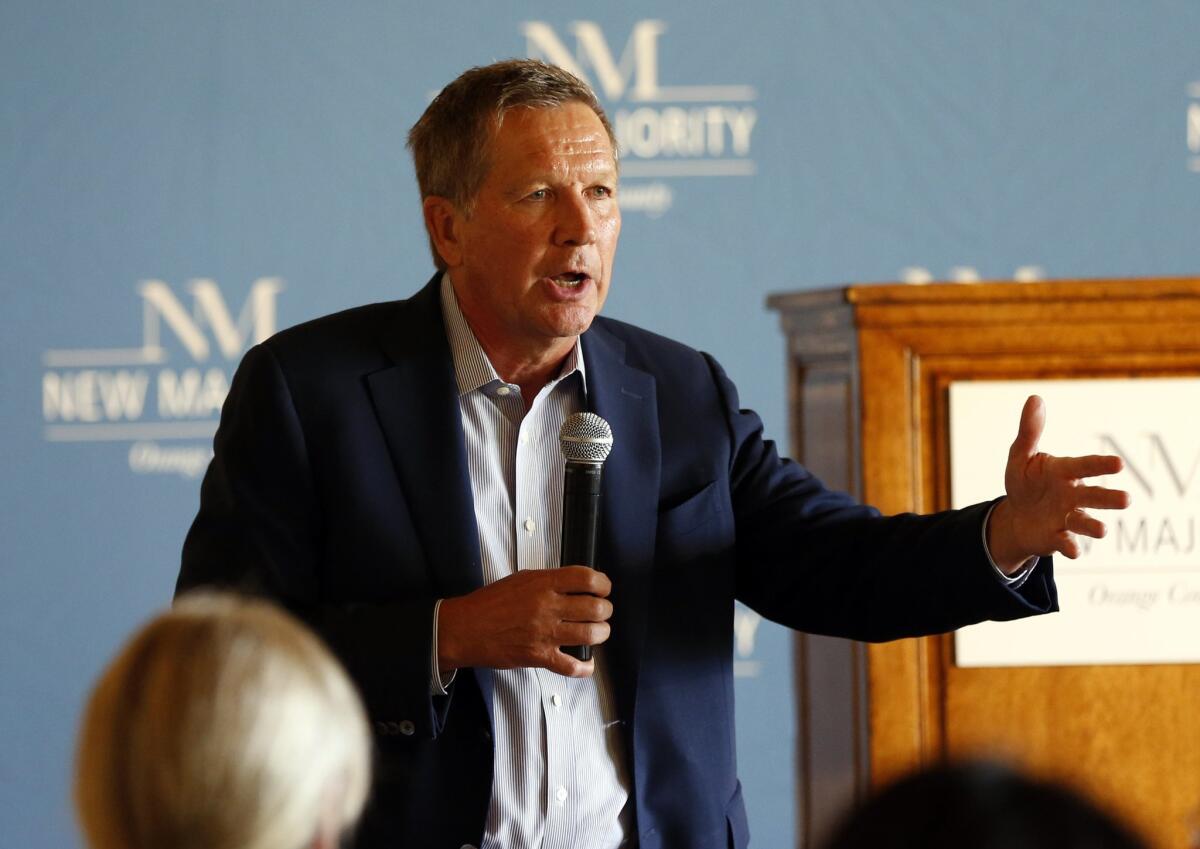
Republican presidential candidate Ohio Governor John Kasich speaks at the New Majority Orange County luncheon in Irvine, Calif., Thursday, Sept. 17, 2015. (AP Photo/Alex Gallardo)
IRVINE -- Sharing an anecdote Thursday at a campaign event as he spoke about Republicans trying to attract Latino voters, Ohio Gov. John Kasich got tangled up on the details.
At a luncheon hosted at a posh Orange County golf club by a local political action committee, Kasich heap praise upon Latinos -- a crucial voting bloc, with 28 million expected to be eligible to vote in the 2016 election -- for family values and work ethic, but then appeared to indirectly conflate Latinos and service-industry workers.
"A lot of them do jobs that they're willing to do and, uh, that's why in the hotel you leave a little tip," said Kasich before a small group inside the Shady Canyon Golf Club, nestled in a gated Irvine neighborhood.
Kasich went on to tell a story about his stay at a hotel in Los Angeles in recent days.
"This lady wrote me in my hotel there in L.A. She wrote this note. It said, 'I really want you to know that I care about your stay.' Is that just the greatest thing?" he said. "So, you know, we can learn a lot and she's Hispanic, 'cause I didn't know it at the time, but I met her in the hallway -- asked her if I could get a little more soap,” said a chuckling Kasich.
Though Kasich consistently touts his off-the-cuff style, often speaking without a teleprompter or prepared remarks, the statement about tipping hotel workers was striking for its inarticulateness. When asked to expound on the governor's remarks, a spokesman for Kasich, Chris Schrimpf, insisted that the candidate was merely talking about the hospitality industry.
"He was talking about how great the service was and how we should respect everyone in our society, no matter what their job or position might be," Schrimpf said.
Some local Latino activists viewed it as offensive.
"Most candidates have lopsided, stereotypical ideas about immigrants, which include the sense that immigrants, especially undocumented immigrants, are only good while serving others," said Jorge-Mario Cabrera, communications director of the Coalition for Humane Immigrant Rights of Los Angeles. "The comment lacks history, sense of how important immigrants are to our economy, and vision where immigrants are more than just 'the help.'"
Kasich is among the more moderate Republicans when it comes to proposed fixes to the immigration system widely viewed as broken. He supports a path to legal status for the estimated 11 million people in the country illegally. Kasich, who served in Congress before he was elected governor, also supports the completion on construction of a wall along the U.S.-Mexico border.
During Wednesday's debate in Simi Valley, Kasich, who is polling toward the middle of the crowded 2016 field, offered fairly moderate views compared with some of his challengers. He opposes shutting down the federal government in an effort to defund Planned Parenthood, a plan pushed by Texas Sen. Ted Cruz, who is also seeking the Republican nomination for president.
As the cast of White House hopefuls sparred with front-runner Donald Trump, Kasich sought to distance himself from the tussles.
"If I were watching at home, I'd turn this off," he said during the debate.
Speaking to reporters after the golf club event Thursday, Kasich said he was pleased with his debate performance, despite the limited attention on him on the crowded stage.
"We're all frustrated we don't get enough time," he said. "I thought yesterday was a little bit of a demolition derby ... sometimes when you get one of those, you got to make sure your car keeps running."
Republican primary remains ratings gold for cable news
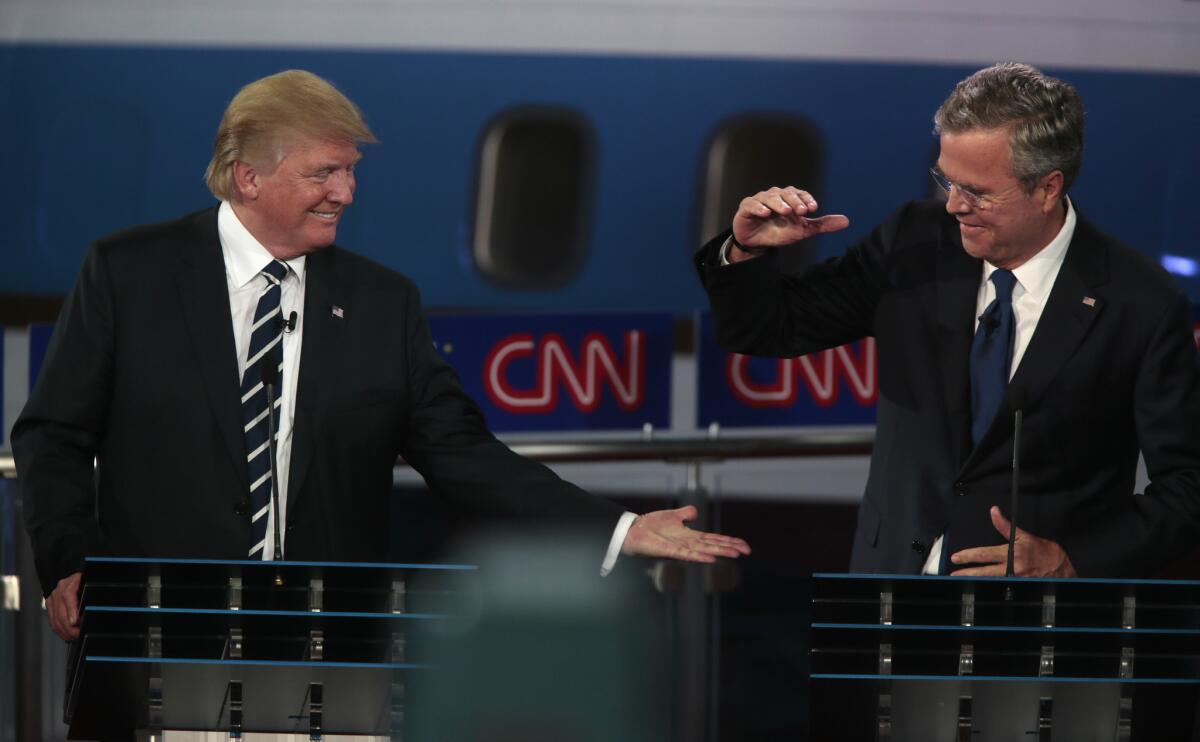
Donald Trump and Jeb Bush high-five during the Republican presidential debate at the Ronald Reagan Presidential Library in Simi Valley on Sept 16.
CNN's Republican primary debate didn't match the record-breaking ratings of Fox News' Republican debate -- but it came close.
An average audience of 22.9 million viewers tuned it, making it the most watched event in the 35-year history of the cable news channel, writes The Times' Stephen Battaglio.
Donald Trump appears to be the draw. CNN didn't skimp on promotion, hyping the debate as a battle between the celebrity candidate and the rest of the field.
The Aug. 6 debate on Fox News pulled in 24 million viewers, making it the most watched event ever on cable TV excluding sports programming.
Carly's confidence
Carly Fiorina declined to meet with reporters after the debate, in what an aide described to The Times as a “mic drop” moment.
The crucial questions going forward are whether Fiorina, the former Hewlett-Packard chief, can translate her debate-stage success into tangible support from the GOP voters who will pick the party's nominee for the White House, and whether her underfunded operation has the organizational capacity to reap the benefits of newfound momentum.
Give us two minutes, we'll boil down the debate
Cathleen Decker and Mark Z. Barabak are masters of political analysis. Don't miss their sharp (and short) recap of last night's debate.
My favorite moment? Definitely when Mark Z. gives his position on pinstripes.
Who won Wednesday night's Republican debate?
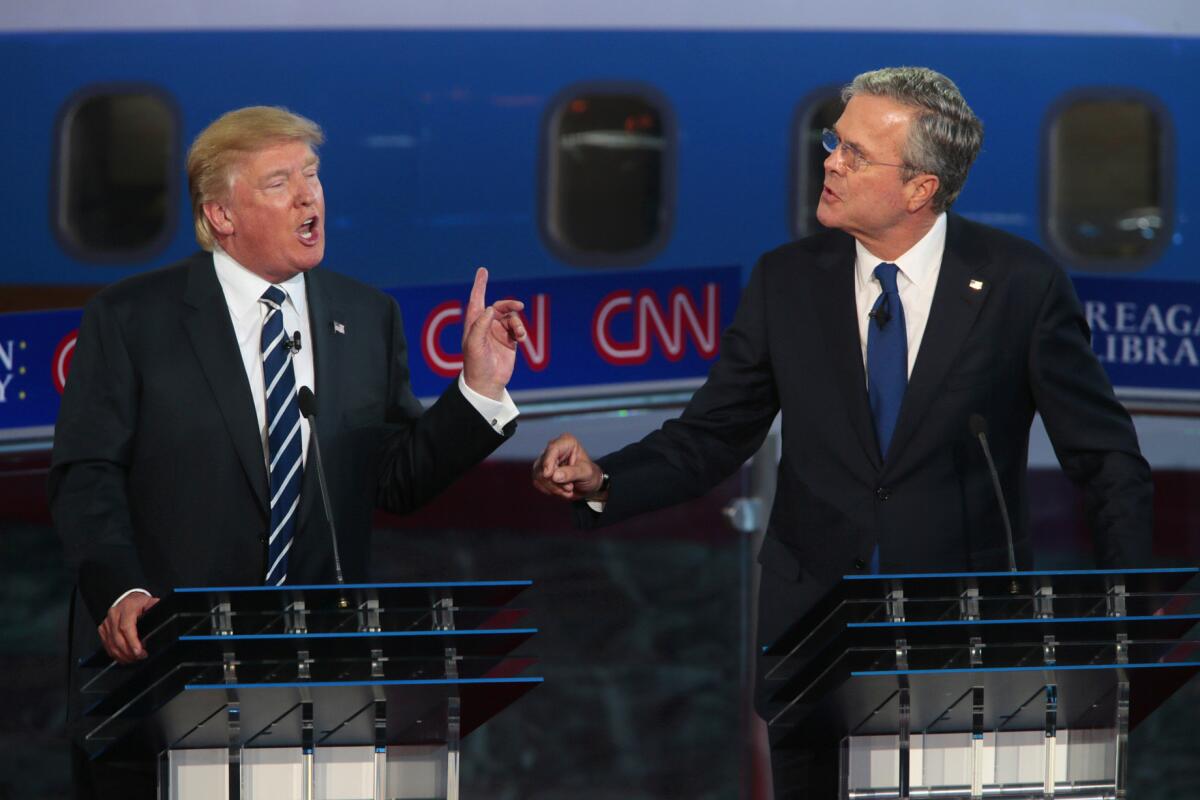
Donald Trump, left and Jeb Bush spar early in the debate.
A horde of commentators have opinions -- some well informed, others not so much -- on who won the Wednesday night's GOP presidential debate, but viewer discretion is advised.
Remember that a little over a month ago, most analysts thought Donald Trump's slap at Sen. John McCain would doom his candidacy. Instead he rose in the polls. Many of the same analysts were also caught by surprise by Ben Carson's rise in the polls in recent weeks.
Political analysts, who naturally pay a lot of attention to the details and nuances of politics, have trouble putting themselves in the shoes of average voters, who generally don't pay attention to such things.
Average voters do respond to polls, which provide a much more reliable view of the campaign's ups and downs. But good polling data takes a while to gather, so don't expect much until early next week at best. Quickie polls that come out within a day or two of an event like a debate have a bad track record.
One other source of useful information responds more rapidly than polling and more reliably than self-appointed experts -- prediction markets.
In recent years, several markets have developed that allow people to bet on the outcomes -- putting their money where their mouths are. Their track records are surprisingly good, although like other forms of trading, they can be prone to volatile swings.
The trading markets have a verdict that disagrees with the pundits: Jeb Bush won.
Yes, the former Florida governor seemed to blow several chances to really slap back at Trump. And, yes, he lacked the dramatic flair of Carly Fiorina or Sen. Marco Rubio. But traders look at the contest differently.
Most traders don't put much stock in Trump's ability to win, giving him about a 15% chance of getting the nomination. So Bush wins unless someone other than Trump can knock him off. And a lot of the other possibilities did badly Wednesday night. As a result, Bush's chances of winning the nomination went up in the markets.
The PredictWise project, which aggregates and analyzes the results of several betting markets, had Bush's chances rising to 39% after Wednesday night's marathon.
The other Floridian in the race, Rubio, also rose in the market's gimlet eye. His chances are now at 17%, according to PredictWise, slightly ahead of Trump's.
Fiorina also gained, according to the prediction markets, but the former Hewlett-Packard executive remains a very long shot, with just a 7% chance.
Big losers: On this, the pundits and the markets agree, Wisconsin Gov. Scott Walker has, for now, tumbled almost completely out of contention. As recently as early August, the markets had Walker as the second-most-likely nominee, with about a 20% shot. His stock has fallen steadily ever since, and it tumbled even more after the debate, to the low single digits.
Donald Trump got double the airtime of Scott Walker last night
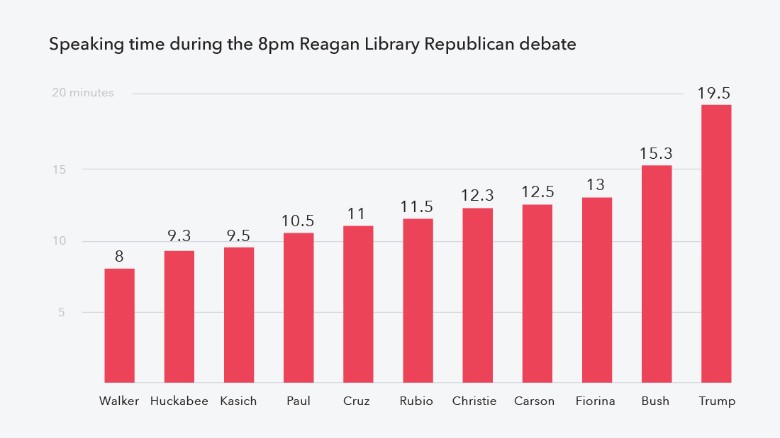
(CNN)
Donald Trump talked more than twice as long as Scott Walker in CNN's GOP presidential primary debate Wednesday, according the network's tally of speaking time.
CNN noted that the speaking times roughly match the candidates' rank in the polls.
Still, if the Trump stat feels a bit surprising, it's likely because the front-runner did much of his talking at very beginning and end of the debate but went quiet for a good portion in the middle. By some counts, Trump was silent for more than 30 minutes. No one expected that.
Debate was a ratings blockbuster for CNN
4 debate moments that showed the establishment-outsider rift in the GOP
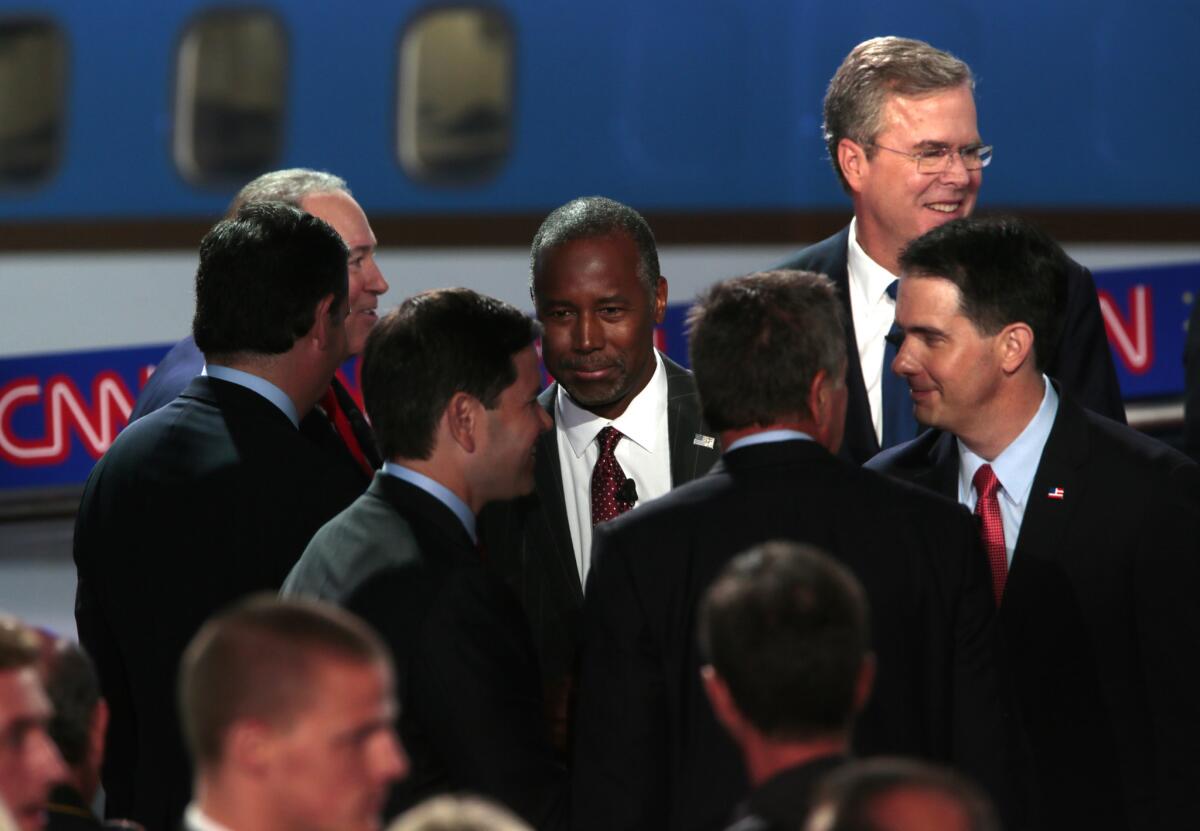
Republican presidential candidates shake hands at the end of the GOP debate at the Reagan Library in Simi Valley.
Last night's GOP primary debate was rife with moments that exposed the tension between the hungry-to-win Republican establishment and the mad-as-hell renegade crowd. It also caught some candidates who belong in the latter pandering to the former. A look at the top four moments that captured the heart of the fight in the GOP primary:
Government shutdown
Politically speaking, there aren't a lot of analysts, pollsters, veteran politicians or historians who would advise forcing a government shutdown the year before an election over an issue that largely fires up your base. And still. GOP lawmakers are threatening to shut down the government if President Obama doesn't go along with a push to cut out money for women's health services at Planned Parenthood. The candidates' answers Wednesday showed whether they fall in the pragmatic, mad or hedging category.
Establishment: “The president of the United States is not going to sign this, and all we're gonna do is shut the government down, and then we're gonna open up -- open it up, and the American people are gonna shake their heads and say, 'What's the story with these Republicans?'” Ohio Gov. John Kasich said.
Mad: “The president says, 'I will veto any budget that doesn't fund Planned Parenthood,' and Republicans surrender,” said Texas Sen. Ted Cruz. “We need to stop surrendering and start standing for our principles.”
Hedge: “I put it in the list,” said New Jersey Gov. Chris Christie. “We should be doing these things and forcing the president to take action.”
Habla español?
The GOP establishment planned to make this the year that the party learned to talk to Latino voters. Some of the outsider candidates have other ideas. Donald Trump, Jeb Bush and Marco Rubio hashed it out on stage.
Mad: “We have a country, where, to assimilate, you have to speak English. -- This is a country where we speak English, not Spanish,” Trump said.
Establishment: “I do give interviews in Spanish, and here's why -- because I believe that free enterprise and limited government is the best way to help people who are trying to achieve upward mobility. And if they get their news in Spanish, I want them to hear that directly from me. Not from a translator at Univision,” said Florida Sen. Marco Rubio.
Hedge: “Well, I've been speaking English here tonight, and I'll keep speaking English.” But if a student asks him something in Spanish, “I'm going to show respect and answer that question in Spanish,” Bush said.
John Roberts, the fallen idol
Chief Justice John G. Roberts Jr., George W. Bush appointee and Reagan White House lawyer, was once considered a firewall against a liberal takeover of the Supreme Court. If you still believe that, you know which side of the establishment-outsider divide you're on.
Establishment: “He's one of the most qualified men to ever come before the United States Senate and I don't agree with his decision, but 99 times out of 100, I will,” said Lindsey Graham.
Mad: “I've known John Roberts for 20 years. He's an amazingly talented lawyer,” said Ted Cruz. “But, yes, it was a mistake when he was appointed to the Supreme Court.”
Hedge: “John Roberts has made some really good decisions, for sure, but he did not have a proven, extensive record that would have made the clarity the important thing, and that's what we need to do,” Bush said.
Just about everything Lindsey Graham said
Graham seized the pragmatic, establishment mantle in the undercard debate and ran with it. At times he appeared to be begging people to focus on winning. A few of his memorable lines:
On George W. Bush's immigration reform push: “George W. Bush ... who won with Hispanics. In my world, Hispanics are Americans.”
On working with Democrats: “Well, Ronald Reagan did a couple of really big things that we should all remember. He sat down with Tip O'Neill, the most liberal guy in the entire House. They started drinking together. That's the first thing I'm going to do as president. We're going to drink more.”
On the shutdown: “I'm not going to tell you things I can't do. I'm not going to tell you by shutting the government down, we're going to defund Obamacare as long as he's president. All that does is hurt us. I am trying to lead this party to winning.”
Louisiana Gov. Bobby Jindal in response, “If we can't win ... on that issue, there is no point for being cheaper Democrats, no point grabbing a second liberal party. It is time to get rid of the Republican Party, start over with a new one that's at least conservative.”
Carly Fiorina has been working up to this moment for weeks
Carly Fiorina's "mic drop" moment didn't come out of nowhere. The former California executive has been plugging away on the stump all summer and the Times has been there to watch, writes Seema Mehta.
Check out the link below for a roundup of highlights of The Times' Fiorina coverage.
Behind the scenes at the GOP debate, Snapchat-style
Hillary Clinton takes a call from 'Donald Trump'
As Hillary Rodham Clinton's campaign staff was gearing up its pre-debate rapid response machine Wednesday evening, fine-tuning talking points that warned a Republican in the White House would be disastrous for the country, the candidate herself was taking a more lighthearted approach.
She was at a taping of the "Tonight Show," sitting for a mock interview with Donald Trump himself, as played by host Jimmy Fallon. Fake Trump rudely interrupted Clinton, told her he will see her at his next wedding and then offered his perspective on women's issues: “I know a lot of women. They all have issues.”
In the real interview with Fallon that followed, Clinton, uncharacteristically breezy and unguarded, admitted a fascination with Donald Trump and joked about why she needs a teleprompter and he doesn't.
“He is making the most out of it,” she said of Trump's presidential bid. “I am a having a good time watching -- I find it amazing.” Maybe, she joked, Trump's erratic behavior and tendency to hurl biting insults would stir other heads of state to be more cooperative. As for the teleprompter, she said it's easy not to use one when you “go stream of consciousness.” She then mimicked Trump's voice and declared: “Let's get rid of the people who don't agree with us and only talk to people who do. You can do that without a teleprompter.”
There were hair jokes -- Clinton let Fallon take a hard tug at hers to prove it is real -- and email jokes. And questions about that selfie Clinton took with Kim Kardashian and Kanye West at a fundraiser that took place during the prior GOP debate.
“I didn't know they were coming,” Clinton said. “They were just delightful.”
As GOP debates fate of 11 million immigrants, Obama launches campaign to push citizenship
The morning after a Republican presidential debate devoted partly to denigrating the Democratic president's approach to immigration, President Obama on Thursday kicked off a campaign of his own -- a public awareness drive to help 8.8 million eligible immigrants become naturalized U.S. citizens.
“Join us,” Obama says in a new video inviting people to become citizens. “Together we can make America stand even stronger.”
Advisors to the president say the timing of the new campaign is not at all political, but rather a policy project long in the works. The “Stand Stronger” citizenship awareness campaign was suggested months ago by an Obama task force.
It's designed to help people who live, work and raise families in the U.S. and already are eligible for naturalization, said one senior administration official who requested anonymity to discuss the campaign ahead of its launch.
Many people meet the requirements for citizenship, the official said, but they either don't know it or are intimidated by testing and fee requirements.
“This is the most American of American things,” the official said. “We don't see it as something in the controversial space. It's really in the American-flag-and-apple-pie space.”
Still, the campaign launches amid fiery controversy over American immigration policy. The Republican presidential field is caught up in a furious debate with one emerging area of consensus: Whatever the proper solution may be to the 11 million undocumented immigrants now in the country, GOP candidates agree, Obama's solution isn't it.
Last year, the president signed an executive order that staves off deportation for as many as 5 million otherwise law-abiding undocumented immigrants. His policies have become a particular hot-button issue in the Republican primary as real estate mogul Donald Trump leads the polls while railing about them.
On Wednesday night, Trump talked again about his plan to build a wall along the border with Mexico and his desire to round up and deport the estimated 11 million people in the country without legal documentation. "It can be done with proper management and it can be done with heart," he said.
Former Florida Gov. Jeb Bush, who has said he would overturn Obama's executive orders, offered a more moderate view on immigration Wednesday night.
"We're at a crossroads right now," he said. "Are we going to take the Reagan approach -- the hopeful, optimistic approach that says that you come to our country legally, you pursue your dreams ... you create opportunity for all of us? Or the Donald Trump approach? The approach that says everything is bad, everything is coming to an end?"
Oddly enough, Obama's new campaign is based on that basic idea, that new citizens make the country stronger.
First thing Thursday morning, the White House launched its new “Stand Stronger” effort to find people eligible for American citizenship and help them through the process.
As part of the campaign, the administration will now allow people to use a credit card to pay the $685 naturalization fee, while also cranking up the publicity for the waivers available to low-income applicants.
In addition, interested applicants will be able to go online to find citizenship classes near their homes. They'll also be able to take -- and retake -- practice versions of the civics exams that people must pass before their applications can proceed.
At the same time, the administration is recruiting volunteers to join a “Welcoming Communities Corps” to “engage in local immigrant integration efforts,” said the senior administration official.
Obama is calling on local communities to “act on a set of principles to build inclusive, welcoming communities that allow all residents to thrive and succeed,” the official said.
The 8.8 million people the administration says are eligible for naturalization are legal permanent residents, immigrants who have a green card and meet other requirements, such as having five years of residence.
They are legal immigrants and are not included in the 11 million immigrants estimated to be in the country without legal documents for residence, according to an Obama aide.
5 takeaways from the marathon debate
The main GOP debate in Simi Valley took hours, and it felt like it. There were insults and policy clashes. But the large field made it difficult at times to keep track of who was saying what. Still, we managed these five takeaways:
Politicians are evil: The word "politician" has become the dirtiest insult in the Republican lexicon, even among the politicians themselves running for president. It has become as much of a smear as "liberal" was in 1988, when George H.W. Bush used the term to insult Massachusetts Gov. Michael S. Dukakis, the Democrat he clobbered to win the presidency.
Former Hewlett-Packard Chief Executive Carly Fiorina derisively compared Donald Trump's business record to "politicians [who] have run up mountains of debt using other people's money."
Ted Cruz, the Texas senator, was courting voters "looking for someone to stand up to career politicians in both parties." Scott Walker, who began running for the state Assembly when he was 22, tried to gain outsider cred by denouncing congressional Republicans.
Chris Christie, the New Jersey governor, said he was not an insider because "I'm a Republican in New Jersey. I wake up every morning as an outsider."
So who actually owned up to being a politician? Donald Trump, whose large lead in the polls has inspired all the p-word hate: "I'm now a politician for about three months. Obviously, I'm doing pretty well. I'm No. 1 in every poll by a lot."
Trump is still getting under Jeb Bush's skin: Bush had vowed to get more aggressive in response to Trump's insults. And he was.
But his face seethed with anger and frustration nearly every time Trump spoke. And almost everything Trump said about Bush dripped with condescension. The two men stood side by side, as they did in the August debate, and CNN's questioners were eager to pit them against each other in several questions.
"OK, more energy tonight. I like that," Trump said to Bush at one point, cutting off the former Florida governor when he was trying to dig at Trump for donating to Democrats.
When Bush called out Trump for pushing casino gambling in Florida, Trump simply denied it. "I promise if I wanted it, I would have gotten it," Trump said.
"No way," Bush retorted. "Believe me."
Their encounter came to a head when Bush demanded an apology from Trump for injecting his Mexican-born wife into the immigration debate. Trump simply refused.
"I won't do that because I said nothing wrong," he said. "But I hear your wife is a lovely woman."
So generous.
Fiorina made the most of the big stage: Fiorina, who has risen in polls since August's debate, was the only candidate to graduate from the second-tier debate last month to the main stage Wednesday.
She gave memorable remarks and repeatedly offered some of the most passionate answers while successfully ducking questions she did not want to field. She spoke personally about burying a child who suffered from drug addiction.
She gave Trump a withering look when moderator Jake Tapper asked about his comment in Rolling Stone that mocked her appearance. Then she managed to denounce him without seeming to engage him: "I think women all over this country heard very clearly what Mr. Trump said," she said.
Then she won the crowd with a passionate denunciation of abortion and Planned Parenthood (without saying directly whether she would shut down the government to cut the agency's funding): "This is about the character of our nation," she said, staring at the camera.
Mike Huckabee won the award for hating the Iran nuclear deal the most: It was a fierce competition. The candidates, even those who would not tear it up on Day One of their presidency, all said it was a mistake. But it was Huckabee, the former Arkansas governor, who said that "this is really about the survival of Western civilization."
Runner-up goes to Cruz, who said he would campaign with this slogan: "If you vote for Hillary Clinton, you are voting for the Ayatollah Khamenei" (pregnant pause) "to have a nuclear weapon," referring to Iran's supreme leader.
Real differences in approaches to foreign policy: The field was divided on how or whether to engage America's rivals on the world stage, a difference that often emerges in both parties.
Fiorina, for example, said she would cut off communication with Russian President Vladimir Putin: "We've talked way too much to him."
Florida Sen. Marco Rubio reiterated his assertion that Putin is a "gangster" who is exploiting a leadership vacuum left by the Obama administration in the Middle East, suggesting he would treat Putin with contempt.
Trump, for all his insults of American political leaders, said he would get along with Putin and other global rivals. "I believe that I will get along," he said. "Between that, Ukraine, all of the other problems, we won't have the kind of problems that our country has right now with Russia and many other nations." It was another example that Trump's tough rhetoric is often accompanied with surprising positions that set him apart from others in the GOP.
By the numbers
Start your day right
Sign up for Essential California for news, features and recommendations from the L.A. Times and beyond in your inbox six days a week.
You may occasionally receive promotional content from the Los Angeles Times.



